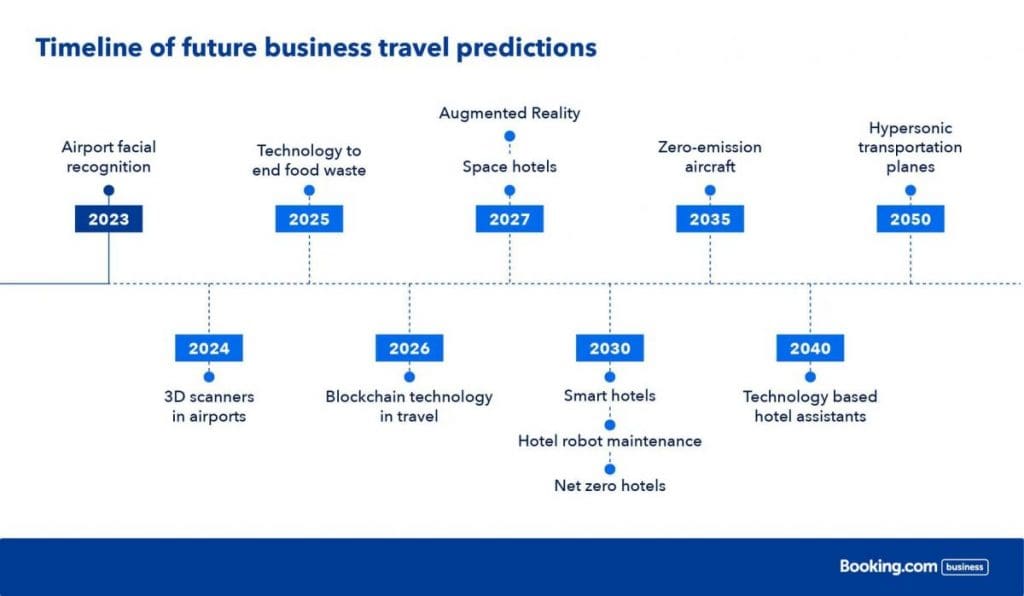Booking.com Unlocks the Future of Travel and Foresees NFTs Making Waves in the Business World by 2026


In Brief
Booking.com for Business provides insights into the future of business travel, examining how technology will shape transportation, accommodation, and activities until 2050.
Blockchain technology is predicted to have a significant impact on the travel industry by 2026, with applications such as NFTs for digital art, access passes, and airline tickets, offering convenience, security, and personalization for travelers.
Hotels are leveraging AI to address food waste, exemplified by the Iberostar Group’s goal of achieving landfill waste-free status by 2025, using data to recommend waste reduction strategies and promoting environmentally conscious stays.
AI will further enhance the hotel industry by optimizing guest comfort and energy efficiency, controlling temperature and ventilation systems, and improving security and privacy through facial recognition, biometric authentication, and smart locks by 2030.
Augmented reality is poised to revolutionize travel and work by 2027, enhancing the experiences of business travelers through location guidance, language translation, virtual exploration, and enriched product presentations.

Business travel is changing rapidly as new technologies emerge. In the future, it’s bound to evolve even more. How will business travelers get around, where will they stay, and what will they do? Booking.com for Business provides data that explores the trends that will shape the future of business travel from now until 2050.

According to Booking.com’s report, blockchain technology will play a significant role in the travel industry by 2026. Some possible applications of blockchain technology in travel include digital art, access passes, and airline tickets as NFTs. Non-fungible tokens can enhance the travel experience by offering more convenience, security, and personalization for travelers.
Future Business Travel Predictions with AI
Several hotels have embraced AI technology to tackle food waste following successful pilot programs. Booking.com shares one example, the Iberostar Group, which uses technology to achieve a landfill waste-free status by 2025. By accurately monitoring food inventory and waste, the company leverages data insights to recommend strategies for waste reduction. This approach can inspire business travelers to opt for environmentally conscious stays, benefiting the planet and organizations committed to carbon-impact initiatives and sustainable goals.
Other predictions suggest smart hotels will use AI to ensure guest comfort and energy efficiency by 2030. This will involve controlling the temperature and ventilation systems to lower energy use and expenses, which can benefit businesses with environmental goals. Moreover, AI will enhance the security and privacy of guests and staff by using facial recognition, biometric authentication, and smart locks.
VR/AR is Set to Revolutionize Travelling
Augmented reality has the potential to revolutionize travel and work by 2027. AR applications can enhance the experience of business travelers in various ways: from providing guidance in unfamiliar locations to facilitating communication in foreign languages. It also enables people to explore places virtually or to access additional information about a site by overlaying digital content in the real world. Similarly, product presentations can be enriched with AR, allowing potential customers and clients to see and interact with products in new ways.
Booking.com previously surveyed over 24,000 travelers from 32 countries to discover how VR and metaverse will influence their travel choices in 2023. The results show that 43% of travelers will use VR to inspire their holiday destinations, and 46% will be more adventurous after experiencing new places in the metaverse. Asia is the most tech-savvy region, with China, Thailand, and India leading the VR adoption. However, most travelers still prefer physical travel over virtual and want to visit their bucket list destinations in person.
Read more:
- How will the metaverse change the travel experience in 2023?
- Black Platinum Gold launches luxury travel NFT
- The Impact of Artificial Intelligence on the Travel Industry
Disclaimer
In line with the Trust Project guidelines, please note that the information provided on this page is not intended to be and should not be interpreted as legal, tax, investment, financial, or any other form of advice. It is important to only invest what you can afford to lose and to seek independent financial advice if you have any doubts. For further information, we suggest referring to the terms and conditions as well as the help and support pages provided by the issuer or advertiser. MetaversePost is committed to accurate, unbiased reporting, but market conditions are subject to change without notice.
About The Author
Agne is a journalist who covers the latest trends and developments in the metaverse, AI, and Web3 industries for the Metaverse Post. Her passion for storytelling has led her to conduct numerous interviews with experts in these fields, always seeking to uncover exciting and engaging stories. Agne holds a Bachelor’s degree in literature and has an extensive background in writing about a wide range of topics including travel, art, and culture. She has also volunteered as an editor for the animal rights organization, where she helped raise awareness about animal welfare issues. Contact her on agnec@mpost.io.
More articles

Agne is a journalist who covers the latest trends and developments in the metaverse, AI, and Web3 industries for the Metaverse Post. Her passion for storytelling has led her to conduct numerous interviews with experts in these fields, always seeking to uncover exciting and engaging stories. Agne holds a Bachelor’s degree in literature and has an extensive background in writing about a wide range of topics including travel, art, and culture. She has also volunteered as an editor for the animal rights organization, where she helped raise awareness about animal welfare issues. Contact her on agnec@mpost.io.





















































